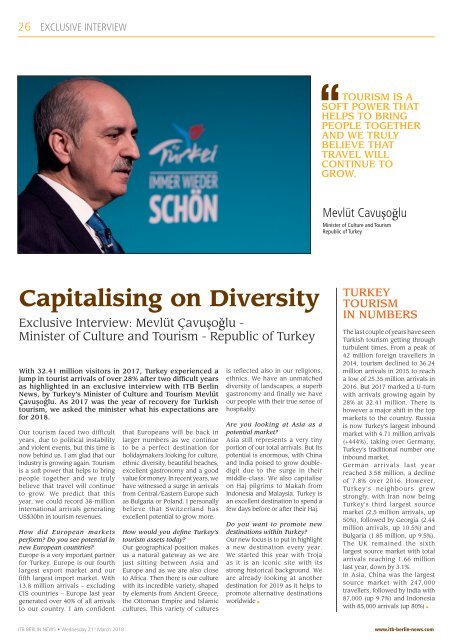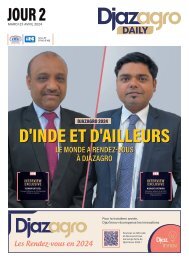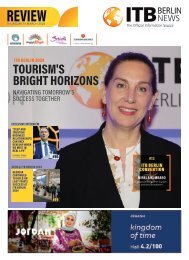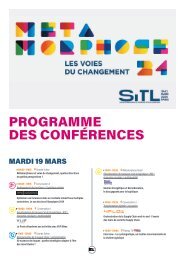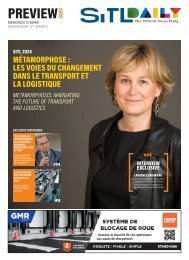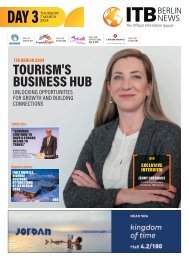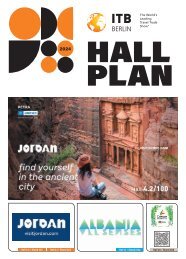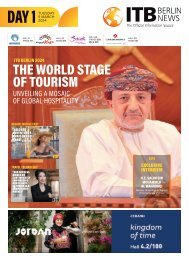Create successful ePaper yourself
Turn your PDF publications into a flip-book with our unique Google optimized e-Paper software.
26 EXCLUSIVE INTERVIEW<br />
TOURISM IS A<br />
SOFT POWER THAT<br />
HELPS TO BRING<br />
PEOPLE TOGETHER<br />
AND WE TRULY<br />
BELIEVE THAT<br />
TRAVEL WILL<br />
CONTINUE TO<br />
GROW.<br />
Mevlüt Cavuşoğlu<br />
Minister of Culture and Tourism<br />
Republic of Turkey<br />
Capitalising on Diversity<br />
Exclusive Interview: Mevlüt Çavuşoğlu -<br />
Minister of Culture and Tourism - Republic of Turkey<br />
With 32.41 million visitors in 2017, Turkey experienced a<br />
jump in tourist arrivals of over 28% after two difficult years<br />
as highlighted in an exclusive interview with <strong>ITB</strong> <strong>Berlin</strong><br />
<strong>News</strong>, by Turkey’s Minister of Culture and Tourism Mevlüt<br />
Çavuşoğlu. As 2017 was the year of recovery for Turkish<br />
tourism, we asked the minister what his expectations are<br />
for <strong>2018</strong>.<br />
Our tourism faced two difficult<br />
years, due to political instability<br />
and violent events, but this time is<br />
now behind us. I am glad that our<br />
industry is growing again. Tourism<br />
is a soft power that helps to bring<br />
people together and we truly<br />
believe that travel will continue<br />
to grow. We predict that this<br />
year, we could record 38-million<br />
international arrivals generating<br />
US$30bn in tourism revenues.<br />
How did European markets<br />
perform? Do you see potential in<br />
new European countries?<br />
Europe is a very important partner<br />
for Turkey. Europe is our fourth<br />
largest export market and our<br />
fifth largest import market. With<br />
13.8 million arrivals – excluding<br />
CIS countries – Europe last year<br />
generated over 40% of all arrivals<br />
to our country. I am confident<br />
that Europeans will be back in<br />
larger numbers as we continue<br />
to be a perfect destination for<br />
holidaymakers looking for culture,<br />
ethnic diversity, beautiful beaches,<br />
excellent gastronomy and a good<br />
value for money. In recent years, we<br />
have witnessed a surge in arrivals<br />
from Central/Eastern Europe such<br />
as Bulgaria or Poland. I personally<br />
believe that Switzerland has<br />
excellent potential to grow more.<br />
How would you define Turkey’s<br />
tourism assets today?<br />
Our geographical position makes<br />
us a natural gateway as we are<br />
just sitting between Asia and<br />
Europe and as we are also close<br />
to Africa. Then there is our culture<br />
with its incredible variety, shaped<br />
by elements from Ancient Greece,<br />
the Ottoman Empire and Islamic<br />
cultures. This variety of cultures<br />
is reflected also in our religions,<br />
ethnics. We have an unmatched<br />
diversity of landscapes, a superb<br />
gastronomy and finally we have<br />
our people with their true sense of<br />
hospitality.<br />
Are you looking at Asia as a<br />
potential market?<br />
Asia still represents a very tiny<br />
portion of our total arrivals. But its<br />
potential is enormous, with China<br />
and India poised to grow doubledigit<br />
due to the surge in their<br />
middle-class. We also capitalise<br />
on Haj pilgrims to Makah from<br />
Indonesia and Malaysia. Turkey is<br />
an excellent destination to spend a<br />
few days before or after their Haj.<br />
Do you want to promote new<br />
destinations within Turkey?<br />
Our new focus is to put in highlight<br />
a new destination every year.<br />
We started this year with Troja<br />
as it is an iconic site with its<br />
strong historical background. We<br />
are already looking at another<br />
destination for 2019 as it helps to<br />
promote alternative destinations<br />
worldwide<br />
TURKEY<br />
TOURISM<br />
IN NUMBERS<br />
The last couple of years have seen<br />
Turkish tourism getting through<br />
turbulent times. From a peak of<br />
42 million foreign travellers in<br />
2014, tourism declined to 36.24<br />
million arrivals in 2015 to reach<br />
a low of 25.35 million arrivals in<br />
2016. But 2017 marked a U-turn<br />
with arrivals growing again by<br />
28% at 32.41 million. There is<br />
however a major shift in the top<br />
markets to the country. Russia<br />
is now Turkey’s largest inbound<br />
market with 4.71 million arrivals<br />
(+444%), taking over Germany,<br />
Turkey’s traditional number one<br />
inbound market.<br />
German arrivals last year<br />
reached 3.58 million, a decline<br />
of 7.8% over 2016. However,<br />
Turkey’s neighbours grew<br />
strongly, with Iran now being<br />
Turkey’s third largest source<br />
market (2.5 million arrivals, up<br />
50%), followed by Georgia (2.44<br />
million arrivals, up 10.5%) and<br />
Bulgaria (1.85 million, up 9.5%).<br />
The UK remained the sixth<br />
largest source market with total<br />
arrivals reaching 1.66 million<br />
last year, down by 3.1%.<br />
In Asia, China was the largest<br />
source market with 247,000<br />
travellers, followed by India with<br />
87,000 (up 9.7%) and Indonesia<br />
with 85,000 arrivals (up 80%)<br />
<strong>ITB</strong> BERLIN NEWS • Wednesday 21 st March <strong>2018</strong><br />
www.itb-berlin-news.com


